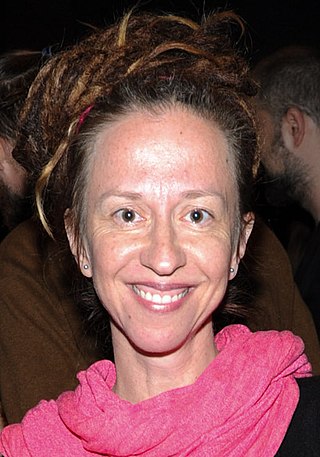Related Research Articles
Claude Jutra was a Canadian actor, film director, and screenwriter.
Jeremy Podeswa is a Canadian film and television director. He is best known for directing the films The Five Senses (1999) and Fugitive Pieces (2007). He has also worked as director on the television shows Six Feet Under, Nip/Tuck, The Tudors, Queer as Folk, and the HBO World War II miniseries The Pacific. He has also written several films.

Ingrid Veninger is a Canadian actress, writer, director, producer, and film professor at York University. Veninger began her career in show business as a child actor in commercials and on television; as a teen, she was featured in the CBC series Airwaves (1986–1987) and the CBS series Friday the 13th: The Series (1987–1990). In the 1990s, she branched out into producing, and, in 2003, she founded her own production company, pUNK Films, through which she began to work on her own projects as a writer and director.
The Academy of Canadian Cinema and Television presents an annual award for Best Motion Picture to the best Canadian film of the year.
The Academy of Canadian Cinema and Television presents an annual award for Best Performance by an Actor in a Leading Role to the best performance by a lead actor in a Canadian film. The award was first presented in 1968 by the Canadian Film Awards, and was presented annually until 1978 with the exception of 1969, when no eligible feature films were submitted for award consideration, and 1974 due to the cancellation of the awards that year.
The Academy of Canadian Cinema & Television presents an annual award for Best Performance by an Actress in a Leading Role to the best performance by a lead actress in a Canadian film. The award was first presented in 1968 by the Canadian Film Awards, and was presented annually until 1978 with the exception of 1969, when no eligible feature films were submitted for award consideration, and 1974 due to the cancellation of the awards that year.
The Academy of Canadian Cinema and Television presents an annual award for Best Achievement in Direction to the best work by a director of a Canadian film.
The Academy of Canadian Cinema and Television presents an annual award for Best Achievement in Cinematography, to honour the best Canadian film cinematography.
The Canadian Screen Award for Best Achievement in Art Direction/Production Design is awarded by the Academy of Canadian Cinema and Television to the best Canadian film art direction/production design.
Patrice Vermette is a Canadian production designer/art director. He is most noted for his work on the films C.R.A.Z.Y., for which he won both the Genie Award for Best Art Direction/Production Design at the 26th Genie Awards and the Jutra Award for Best Art Direction at the 8th Jutra Awards, and Dune, for which he won the Academy Award for Best Production Design at the 94th Academy Awards.
The Canadian Screen Award for Best Costume Design is awarded by the Academy of Canadian Cinema and Television to the best Canadian costume designer. It was formerly called the Genie Award for Best Achievement in Costume Design before the Genies were merged into the Canadian Screen Awards.
The Canadian Screen Award for Best Live Action Short Drama is awarded by the Academy of Canadian Cinema and Television to the best Canadian live action short film. Formerly part of the Genie Awards, since 2012 it has been presented as part of the Canadian Screen Awards.
Eclipse is a Canadian drama film, written and directed by Jeremy Podeswa and released in 1994.
Wiebke von Carolsfeld is a German Canadian film director, writer and editor. Her debut feature film as a director, Marion Bridge, won the Toronto International Film Festival Award for Best Canadian First Feature Film at the 2002 Toronto International Film Festival.
Camelia Frieberg is a Canadian film producer and director. She is a two-time winner of the Genie Award for Best Picture, as producer of Atom Egoyan's films Exotica and The Sweet Hereafter.
The Academy of Canadian Cinema and Television's Award for Best Short Documentary is an annual Canadian film award, presented to a film judged to be the year's best short documentary film. Prior to 2012 the award was presented as part of the Genie Awards program; since 2012 it has been presented as part of the expanded Canadian Screen Awards.
The Toronto New Wave refers to a loose-knit group of filmmakers from Toronto who came of age during the 1980s and early 1990s.
In Search of the Last Good Man is a Canadian comedy-drama short film, directed by Peg Campbell and released in 1989. Cowritten with Peggy Thompson as a follow-up to their 1986 short film It's a Party!, the film blends live action and animation to depict a group of women in a coffee shop talking about their relationships with men.
Thomas Vámos is a Hungarian-Canadian cinematographer. He is most noted as a two-time Genie Award nominee for Best Cinematography, receiving nominations at the 10th Genie Awards in 1989 for The Revolving Doors and at the 13th Genie Awards in 1992 for Being at Home with Claude.
Sylvain Guy is a Canadian screenwriter and film director from Quebec. He is most noted for the 2004 film Machine Gun Molly , for which he and Luc Dionne won the Genie Award for Best Adapted Screenplay at the 25th Genie Awards in 2005. He was also previously nominated in the same category for Black List at the 16th Genie Awards in 1996, and subsequently at the 10th Canadian Screen Awards in 2022 for Confessions of a Hitman (Confessions).
References
- 1 2 3 "Overnight: a loving look at the trials of filmmaking". The Globe and Mail , September 12, 1986.
- ↑ "Genie promises skits both dramatic, comic". The Globe and Mail , March 13, 1987.